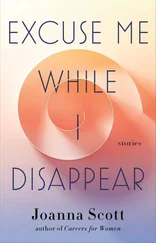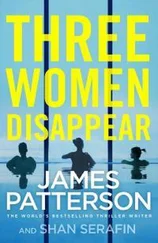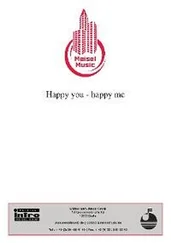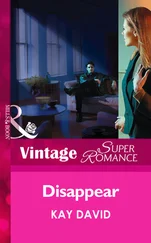The couple behind us is smiling again, and though I smiled back at their infatuated, wide-open faces before, now I turn away. I suppose I’m feeling a tad bashful, and Bernard must sense this, for he nudges me over in front of him until I feel his chest warming my back.
We don’t say anything else until it’s our turn at the counter. Behind the glass stands a thin old man with a large nose. Maybe he’s run this kiosk every summer since he was young. By his side is a plump teenage girl, perhaps his granddaughter. Or the daughter of a friend. Will she stand here for another fifty years too?
We get our orders and carry the limp paper plates with the waffles over to our table. The tables and chairs stand directly on the bare granite; they look old, with thin metal frames and wooden seats and backs where the white paint has flaked off.
“See that gull over there?” I ask. “A second ago it caught a fish.”
“What, did it dive?”
“Yes. It flew over by that red boat, and suddenly it plunged, straight down. Like a raptor.”
“Do you want to sit in this chair? Then it’ll be easier for you to see over there.”
“No, I’m just fine sitting here.”
In this manner we continue to unwind, together in the emptiness.
“You think the people sitting over by that poster are Danes?”
“Did you hear them speak Danish?”
“No, it’s just that … there’s something about them.”
Then we grow quiet again.
We’re so close to Denmark. But here in Sweden, no one knows who we are.
We walk out onto the rocks, maintaining our balance all the way down to the water, sometimes holding hands and other times proceeding separately and using the rocks for support. We stretch out upon a great flat stone, feeling the sun on our faces, our bodies. The heat, the calm, the distant sound of chattering children someplace behind us. Our bodies dissolve. And then the shadows are long; we must have lain here for hours, my head upon his chest and his head upon mine, my bare knee over his bare thigh, his hairy thigh across my belly, my nose against his … my eyes … my heel in a puddle of water on the rock.
We walk back toward the harbor and the kiosk. The low sun is golden over the fields and accentuates each rise, each rocky projection here where the Halland Ridge subsides to topsoil and thence to shore and sea. We walk down a path through fields of grain, then up along a rise until we come to a parasol over a table with cardboard baskets of strawberries. A sign says 3 °CROWNS. We take two baskets, leave a hundred-crown note and take forty crowns in change from the small pail of money on the table. We’ll eat the berries tonight, after we’ve eaten dinner in the restaurant beneath the guesthouse where we’re staying. We can eat them in the dark down by the shore or up among the elderly visitors on the guesthouse grounds.
And so it continues: nothing happening. Nothing at last. Nothing, nothing, transparently nothing.
• • •
During dinner that evening, Bernard tells me about the first time he took Lærke to a swimming pool after the accident.
Three months had passed and she still had no initiative at all. She essentially remained sitting wherever Bernard or the staff at the rehab center placed her. She never ventured to do anything of her own accord, and her face never lit up because of something she felt or thought on her own.
Bernard arranged with one of Lærke’s girlfriends who had stuck with her since the car wreck to help Lærke in the dressing room. He stood outside for a long time, waiting for them to come out, and when they emerged and Lærke saw all the water, she started to flail about, out of sheer excitement — her right arm flew up and down, she squealed loudly and started to run toward the water. She fell right away, of course, but they had a good grip on her so she didn’t hit the tiles; they helped her up, and then she started flailing and running and fell once more. Lærke’s friend and Bernard both began to laugh, because it was such a relief to see Lærke suddenly as unmanageable as an overexcited three-year-old. Something had finally gotten through to her.
Lærke knew she wasn’t supposed to act that way at the pool, but just as it was impossible for her to increase her energy level at home through mere force of will, at the pool it was impossible for her to lower it.
Bernard led the two women out into a hallway where Lærke could calm down before they took her back to the water again. They did that twice. The third time she no longer tried to run, but her right arm was still out of control, flying every which way, and she was shouting with such joy that the lifeguard came rushing over and Bernard — who had decided once and for all to never act ashamed of his wife — had to explain that the only thing happening was that Lærke was happy to be there.
Since then, Bernard’s used what he saw at the pool to make Lærke’s life easier. He’s constantly on the lookout for experiences that might increase her engagement at the right time. He can’t take her swimming every time they have to do something important, of course, but less drastic measures also help. Disco music and old video recordings of talk shows with Jarl Friis-Mikkelsen are perfect.
Disco gets put on the stereo fifteen minutes before guests arrive, or before Bernard and Lærke have to go somewhere. If the music remains on for more than ten minutes, Lærke becomes overwrought and agitated, and if it isn’t put on, their friends will be disappointed by how listless she is.
They use Jarl Friis-Mikkelsen to create a calmer joy. Winnie will often pop a talk-show tape in their old VCR before Bernard or the boys come home. Lærke has also learned to manage her own energy level with music and other experiences; with time, it’s become as natural for her as it is for others to drink a cup of coffee or have some candy to wake up or calm down.
This three-day vacation’s the first time since the accident that Bernard’s been away from her for several days in a row. Down in the break room at school, we concocted a story about how he had to work for a business client in Aalborg.
As for me, I signed up for a continuing-ed seminar on pedagogical theory, leaving the course materials around on the dining table and then in my bedroom. I’d stand with program and participant list in hand, talking about how I was looking forward to it. Perhaps I overdid it; it’s hard to know, as I never really paid attention to how much room such papers took up in our family’s everyday clutter.
The stories seemed so simple when Bernard and I planned them, but one lie feeds the next. When Helena heard I was going on a seminar, she naturally asked why in the world I’d chosen to use some of my relatively few days off this summer with these particular teachers, who were so theoretical and impractical. Normally, neither of us would have considered taking a course like that. She wanted to know what I thought I could use their highfalutin theories for in my everyday work — and Frederik happened to hear my reply.
He threw himself into a disquisition on educational theories and challenges, and while otherwise we might have been able to connect with each other through our shared interest in teaching, our discussions now were grounded in lies about what I thought and what I wanted from my job — lies about who I was.
A pall of deceit and alienation settled over our meals and interactions, heavier than before. And when Niklas was there, too.
This must be what it’s like to have an affair, I thought — something I’d never tried before. The real Frederik, my unfaithful spouse from before the tumor, must have lived for years like this, inhabiting two realities at the same time. This had been his life.
On the first morning of the seminar, I showed up and struggled to sit calmly in my chair, unable to focus on anything at all due to pure physical anticipation. A couple of hours later, I told the course leader I was feeling ill, and then I drove to the Elsinore ferry to Sweden and waited for Bernard.
Читать дальше
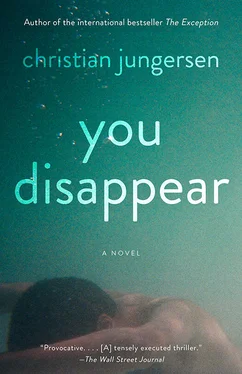
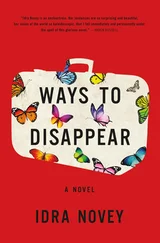

![Ally Carter - [Gallagher Girls 01] I'd Tell You I Love You But Then I'd Have to Kill You](/books/262179/ally-carter-gallagher-girls-01-i-d-tell-you-i-lo-thumb.webp)
